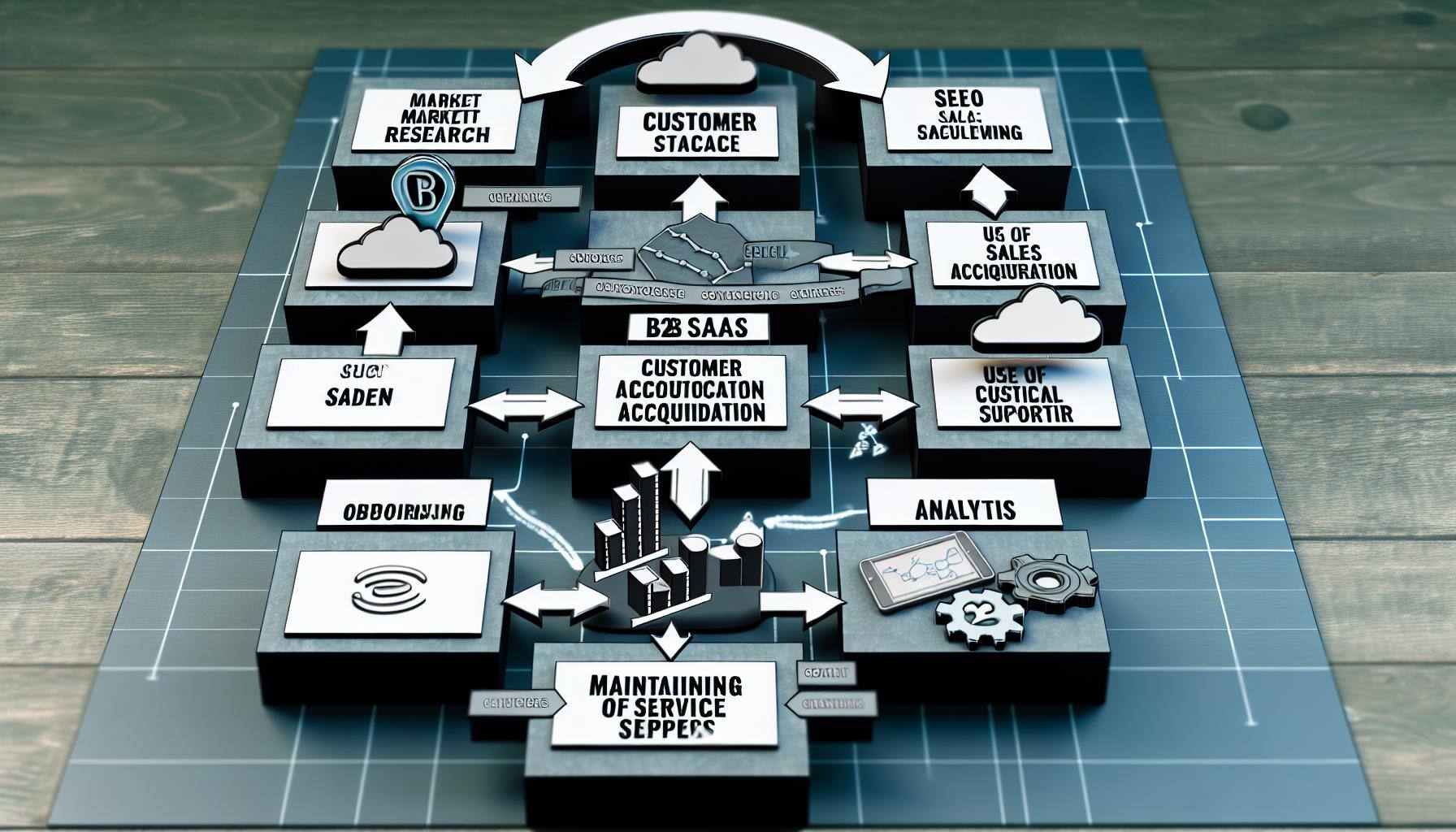How to Build a Successful B2B SaaS Business: Essential Strategies and Tips
Building a successful B2B SaaS (Business-to-Business Software as a Service) company requires a strategic approach and an in-depth understanding of...
4 min read
Brian Polackoff
:
Sep 11, 2024 2:11:00 PM

As the SaaS industry continues to grow at an exponential rate, marketing for SaaS companies in 2024 presents unique challenges and opportunities. Whether you are a seasoned marketing leader or a new marketer in the SaaS space, understanding and addressing the common challenges in SaaS marketing is crucial for sustained growth. This article delves into the primary challenges SaaS companies face in 2024 and the strategies to overcome them, ensuring your SaaS business not only survives but thrives in an increasingly competitive landscape.
One of the most significant SaaS marketing challenges in 2024 is accurately identifying and addressing key pain points of potential customers. As the market becomes saturated with various SaaS products, understanding the exact needs and frustrations of your target audience can set you apart. Effective SaaS marketing relies on deep market research, customer feedback, and data analytics to pinpoint these pain points. By addressing them directly in your marketing campaigns, you demonstrate a keen understanding of your customers’ needs, establishing trust and credibility.
The competitive landscape for SaaS companies in 2024 is fiercer than ever. With an influx of new entrants and innovative solutions, standing out becomes a significant challenge. SaaS businesses must leverage strategic b2b marketing strategies to differentiate themselves. This includes refining their value proposition, investing in cutting-edge digital marketing trends, and continuously monitoring competitor activities. Additionally, understanding the unique challenges of b2b saas marketing helps in crafting messages that resonate well with b2b buyers.
Defining an effective SaaS marketing strategy involves a comprehensive approach combining various marketing efforts tailored to your target audience. It starts with setting clear objectives aligned with the company’s growth goals. A robust SaaS marketing strategy integrates multiple channels, including content marketing, email marketing, social media marketing, and influencer partnerships. In 2024, it is crucial to stay agile and adapt to emerging trends in b2b marketing, such as personalized customer experiences and AI-driven automation tools.
The lengthy sales cycle in B2B SaaS remains a formidable challenge. To optimize the sales cycle, SaaS companies need to implement strategies that reduce friction for b2b buyers. This includes streamlining the lead qualification process, providing clear and concise product information, and utilizing advanced CRM systems. Additionally, aligning sales and marketing teams ensures a cohesive approach to targeting potential customers, thus reducing the time to conversion.
A compelling free trial experience is a cornerstone of many SaaS marketing efforts. However, offering a free trial is not enough; it must be optimized to ensure it effectively demonstrates the product’s value. Enhancements such as guided tours, personalized onboarding, and timely support can significantly improve the user experience during the trial period. This, in turn, increases the chances of conversion from free trial users to paying customers.
Effective onboarding tactics are crucial in retaining new customers and ensuring they realize the value of your SaaS product quickly. Personalized onboarding processes, comprehensive tutorials, and ongoing customer support can mitigate the common challenge of user drop-off post-trial. Moreover, leveraging automated onboarding tools can help streamline the process, providing a seamless experience for new users and ensuring they engage with key product features early on.
In 2024, leveraging the latest digital marketing trends is essential for SaaS companies aiming for growth. Trends such as AI-driven marketing, hyper-personalization, and video content are becoming increasingly prevalent. SaaS marketers must stay abreast of these trends and incorporate them into their marketing strategies to enhance engagement and drive conversions. Additionally, investing in analytics tools can provide insights into campaign performance, enabling continuous optimization.
A comprehensive marketing campaign that integrates various channels and tactics is key to reaching a wider audience and achieving marketing goals. This includes a mix of content marketing, social media marketing, PPC advertising, and SEO strategies. By crafting a campaign that tells a compelling story and highlights your SaaS product's value proposition, you can attract and retain customers more effectively. Regularly updating and tweaking the campaign based on performance metrics ensures sustained success.
Incorporating stakeholder input into your marketing strategies can provide valuable perspectives and enhance campaign effectiveness. Engaging with stakeholders, including customers, employees, and partners, helps in gaining insights into market trends, customer preferences, and potential pain points. This collaborative approach ensures that your marketing efforts are aligned with the expectations and needs of all involved parties, driving better results and fostering strong relationships.
Understanding and accurately targeting the right audience is paramount for B2B SaaS growth. This involves creating detailed buyer personas and conducting thorough market research to identify the needs, behaviors, and preferences of your potential customers. Tailoring your marketing messages and strategies to these specific audiences ensures higher engagement and conversion rates. Additionally, segmenting your audience allows for more personalized and effective marketing efforts.
A compelling value proposition is the foundation of any successful SaaS marketing strategy. It clearly communicates the unique benefits and solutions your SaaS product offers. To craft a strong value proposition, focus on the specific problems your product solves and the tangible outcomes it delivers. This helps differentiate your product in a crowded market and resonates more deeply with your target audience, driving interest and conversions.
Scaling marketing efforts for enterprise SaaS products requires a strategic approach that addresses the complex needs of large organizations. This includes developing tailored marketing campaigns that speak to enterprise-level challenges and demonstrating the scalability and reliability of your solutions. Investing in account-based marketing (ABM) can also be highly effective, as it focuses on personalized campaigns targeting key decision-makers within these organizations.
Improving customer retention is essential for long-term SaaS growth. Effective retention strategies include providing exceptional customer service, regularly engaging with customers through personalized communication, and offering ongoing training and support. Additionally, gathering feedback and continuously improving your product based on customer needs helps in maintaining satisfaction and loyalty. Implementing these strategies can significantly reduce churn rates and enhance customer lifetime value.
Increasing brand awareness is a critical component of SaaS marketing efforts in 2024. Utilizing a mix of PR activities, thought leadership content, and social media marketing can help in building a strong brand presence. Engaging with industry influencers and participating in relevant events and webinars also boosts visibility. A well-executed brand awareness campaign ensures your SaaS product remains top of mind for potential customers.
Measuring the impact of marketing efforts is crucial for optimizing strategies and demonstrating ROI. Implementing robust analytics tools and setting clear KPIs allows marketers to track the performance of various campaigns and initiatives. Regularly analyzing these metrics helps in identifying what works and what doesn’t, enabling data-driven decisions and continuous improvement of marketing tactics. This, in turn, ensures more effective and efficient use of marketing resources.

Building a successful B2B SaaS (Business-to-Business Software as a Service) company requires a strategic approach and an in-depth understanding of...

Building a Successful B2B SaaS Company: A Founder’s Journey Starting and nurturing a B2B SaaS company is a journey that combines innovation,...

The B2B SaaS industry continues to evolve at a rapid pace, necessitating innovative strategies to overcome the myriad of challenges inherent to...